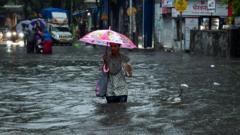A new analysis shows that climate change is jeopardizing blood supplies worldwide by hindering donations and increasing demand during catastrophic weather events.
Climate Change Poses New Threats to Global Blood Supplies

Climate Change Poses New Threats to Global Blood Supplies
A recent study indicates that climate-driven extremes are straining blood donation networks, complicating supply amid rising demand during disasters.
Climate change is negatively impacting a crucial resource: the world's blood supply. According to a groundbreaking study released this week in The Lancet Planetary Health, rising temperatures and extreme weather conditions can hinder blood donations while simultaneously escalating demand for transfusions.
Elvina Viennet, an infectious disease researcher at Australia's University of the Sunshine Coast and a co-author of the study, highlights the urgent nature of this issue, stating, “Any major disruptions to the availability and safety of the blood supply puts lives at risk.” This study marks the first comprehensive evaluation of climate change's effects on blood supply systems globally.
The research team analyzed a series of studies demonstrating how extreme weather events, intensifying due to climate change, impact overall public health by limiting blood supply. Factors such as hurricanes, floods, heat waves, and wildfires can physically prevent people from donating blood, as dangerous conditions might make transportation impossible or distract potential donors with immediate survival concerns.
Mobile blood donation units, vital in times of crisis, can also be rendered ineffectual during such disastrous events, further exacerbating the problem. With these limitations on supply and the potential for increased demand due to injuries and health crises caused by disasters, the blood shortage situation during extreme weather becomes critically concerning.
The pressing need for sufficient blood reserves during emergencies underlines the importance of addressing these environmental challenges to safeguard public health. As the implications of climate change continue to unfold, understanding and adapting blood collection strategies will become increasingly vital.




















